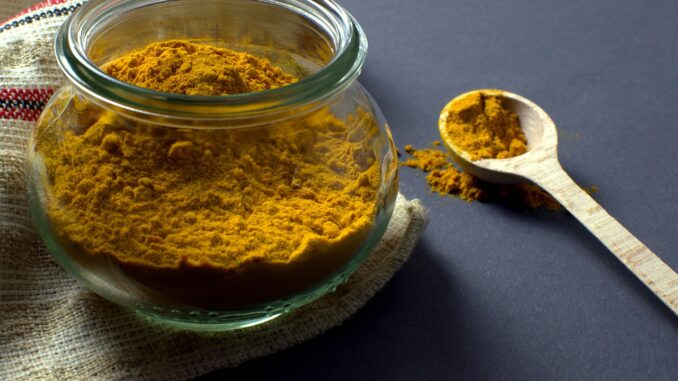
Turmeric Benefits for Inflammation
Turmeric is a yellow-colored spice used in India for centuries. It is best famous for being a crucial component of curries. Because of its numerous medical qualities, including its ability to reduce inflammation and increase antioxidant levels, it has been used as a natural medicine for centuries for various issues including joint problems and arthritis.
Turmeric should provide you with some of the following health benefits if taken consistently:
- Reduced cholesterol levels
- Enhanced cardiac health
- Helps neutralize skin issues
- Beneficial for depression
- Can help with weight loss
- Improves cognitive function
Turmeric should provide you with these benefits due to compounds within it called curcuminoids, with the most potent one being curcumin.
Recommended Dosage of Turmeric for Arthritis
Determining what the best turmeric dosage is for you can vary as it depends on individual factors such as disease severity, health status, and response. However, based on the available studies, we’ve found that the best turmeric dosage for treating arthritis symptoms is from 500mg to 2000mg each day, standardized to at least 95% curcuminoids.
Turmeric Supplements for Joint Pain
There are many ways to take turmeric into your system, but one of the easiest ways to reap out its benefits is through joint supplements that use turmeric. Preferably, these will contain other potent joint nutrients such as MSM, glucosamine, and chondroitin to enhance their formulas in combating arthritis and other joint disorders.
These supplements can usually be found in capsule forms for pain management.
If you choose a turmeric supplement, make sure that the formula is legit; it needs to use only natural ingredients in clinical doses.
A lot of supplements on the market have ingredient formulas that are fake or ineffective. For instance, some products use traditional turmeric powder, which is less effective than an extract; in such cases, it is better and more affordable to purchase a bag of turmeric powder from your neighborhood grocery store.
Other products contain proprietary blends, which prevents you from knowing the precise amounts of each ingredient.
High-quality forms of turmeric, along with other powerful ingredients like MSM, bromelain, selenium, glucosamine, and chondroitin at optimal doses—all necessary for healthy cartilage, joints, and connective tissue healing—are the foundation of the best supplements for joint health and general health.
The best-ranked joint supplement at the moment is Performance Lab Flex.
Turmeric Recipes for Cooking
- Golden Turmeric Rice:
- Ingredients:
- 1 cup basmati rice
- 1 ¾ cups water or vegetable broth
- 1 tablespoon turmeric powder
- ½ teaspoon salt
- 1 tablespoon olive oil or ghee
- Instructions:
- Rinse the rice under cold water until the water runs clear.
- In a pot, heat olive oil or ghee over medium heat. Add turmeric powder and stir for about 30 seconds until fragrant.
- Add rice to the pot and sauté for another minute.
- Pour in water or vegetable broth and add salt. Bring to a boil.
- Reduce heat to low, cover, and simmer for 15-20 minutes, or until the rice is tender and liquid is absorbed.
- Fluff the rice with a fork before serving.
- Ingredients:
- Turmeric Roasted Vegetables:
- Ingredients:
- Assorted vegetables (such as carrots, cauliflower, Brussels sprouts, sweet potatoes)
- 2 tablespoons olive oil
- 1 teaspoon turmeric powder
- Salt and pepper to taste
- Instructions:
- Preheat the oven to 400°F (200°C).
- Chop the vegetables into bite-sized pieces and place them on a baking sheet.
- Drizzle olive oil over the vegetables and sprinkle turmeric powder, salt, and pepper. Toss to coat evenly.
- Roast in the oven for 25-30 minutes, or until the vegetables are tender and lightly browned, stirring halfway through.
- Ingredients:
- Turmeric Smoothie:
- Ingredients:
- 1 ripe banana
- 1 cup frozen pineapple chunks
- 1 teaspoon turmeric powder
- ½ teaspoon ground ginger
- ½ cup plain Greek yogurt or coconut yogurt
- 1 cup coconut water or almond milk
- Honey or maple syrup (optional, to taste)
- Instructions:
- In a blender, combine banana, pineapple, turmeric powder, ginger, yogurt, and coconut water or almond milk.
- Blend until smooth and creamy.
- Taste and adjust sweetness with honey or maple syrup if desired.
- Pour into glasses and enjoy immediately.
- Ingredients:
Turmeric Curcumin Content
The exact curcumin content within turmeric varies depending if you choose turmeric root or turmeric extract. Curcumin makes up around 1 to 7 percent of the root according to research studies and evidence. [study]
Turmeric powder contains around 3.14% of curcumin according to NCBI, while turmeric extract can contain up to 95% of curcumin.
Turmeric Side Effects
Turmeric should be safe for basically everybody when used in moderation. On the other hand, extremely high doses can cause gastrointestinal issues, risk of kidney stones, and allergic reactions, although these are very rare.
Here’s our article from before about turmeric:
Leave a Reply